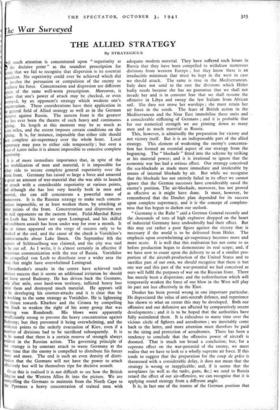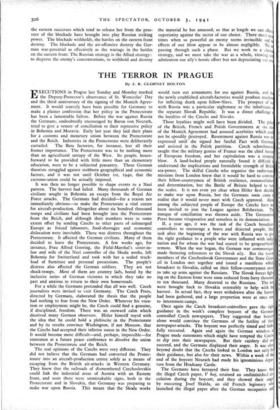1w War Surveyed
THE ALLIED STRATEGY
By STRATEGICUS
0 much attention is concentrated upon " superiority at the decisive point " as the soundest prescription for ctory that we fail to recognise that dispersion is its essential ecedent. No superiority could ever be achieved which did involve the persuasion or compulsion of the enemy to stribute his force. Concentration and dispersion are different pects of the same well-worn prescription. Moreover, it lows that one's power of attack may be checked, or even estroyed, by an opponent's strategy which weakens one's ncentration. These considerations have their application in e general field of Allied strategy as well as in the German nsive against Russia. The eastern front is the greatest has ever been the theatre of such heavy and continuous bung. Its length at this moment may be as much as coo miles, and the extent imposes certain conditions on the ting. It is, for instance, impossible that either side should ve complete air-supremacy over the whole front. Local premacy may pass to either side temporarily ; but over a ace of 2,000 miles it is almost impossible to conceive complete periority.
It is of more immediate importance that, in spite of the t mobilisation of men and material, it is impossible for ther side to secure complete general superiority over the ole front. Germany has raised so large a force and amassed great an amount of war-material that she was able to launch r attack with a considerable superiority at various points, d although she has lost very heavily both in men and terial, she can still concentrate a powerful mass of noeuvre. It is the Russian strategy to make such concen- ations impossible, or at least weaken them, by attacking at ther points of the front. Concentration and dispersion are real opponents on the eastern front. Field-Marshal Ritter Leeb has his heart set upon Leningrad, and his skilful d stubborn assault has been under way for over a month. It as at times appeared on the verge of success only to be hecked at the end, and the cause of the check is Vorishilov's ounter-attacks about Lake Ilmen. On September 8th the pture of Schliisselburg was claimed, and the city was said o be cut off. As I write, it is almost certainly in effective if ecarious communication with the rest of Russia. Vorishilov s compelled von Leeb to distribute over a wider area the orce that might have overwhelmed Leningrad.
Timoshenko's attacks in the centre have achieved such vious success that it seems an additional irritation he should t have saved Budenny. He has driven back the Germans, ile after mile, over hard-won territory, inflicted heavy loss Pon them and destroyed much material. He appears still o be developing his counter-attacks and it is clear that he working to the same strategy as Vorishilov. He is lightening thrust towards Kharkov and the Crimea by compelling on Bock to weaken the right of his army group that was sisting von Rundstedt. His blows were apparently sufficiently strong to prevent the heavy concentration against udenny; but they prevented it being overwhelming, and the 'dente points to the orderly evacuation of Kiev, even if a umber of divisions had to be sacrificed subsequently. It is 0 be noted that there is a certain reserve of strength always dent in the Russian action. The governing principle of r strategy is by constant attack to waste Germany at the e time that the enemy is compelled to distribute his forces ore and more. The end is such an even density of distri- bution that the Germans will not have the power to attack effectively but will be themselves ripe for decisive assault.
Once this is realised it is not difficult to see how the British Empire and the Western Allies fit into the picture. We are Compelling the Germans to maintain from the North Cape to the Pyrenees a heavy concentration of trained men with adequate modern material. They have suffered such losses in Russia that they have been compelled to withdraw numerous divisions from western Europe ; but they know there is an irreducible minimum that' must be kept in the west in case we should attack. The same is true in the Mediterranean. Italy dare not send to the east the divisions which Hitler badly needs because she has no guarantee that we shall not invade her and is in constant fear that we shall resume the offensive in Libya and sweep the last Italians from African soil. She dare not move her warships ; she must retain her air force in the south. The fears of British action in the Mediterranean and the Near East immobilise these units and a considerable stiffening of Germans ; and it is probable that for our numerical strength we are pinning down as many men and as much material as Russia.
This, however, is admittedly the preparation for victory and not victory itself. But it is an indispensable part of the allied strategy. This element of weakening the enemy's concentra- tion has formed an essential aspect of our strategy from the beginning. The " blockade " fitted into the scheme by striking at his material power; and it is irrational to ignore that the economic war has had a serious effect. Our strategy conceived the sea-blockade as made more immediate and intolerable by means of internal blockade by air. But while we recognise that the blockade has not entirely failed in its effect we cannot ignore that the German successes have considerably eased the enemy's position. The air-blockade, moreover, has not proved as effective as it might have done. It must, however, be remembered that the Douhet plan depended for its success upon complete supremacy, and it is the concept of complete- ness that has begun to darken our outlook.
" Germany is the Ruhr " said a German General recently and the thousands of tons of high explosive dropped on the heart of industrial Germany have undoubtedly had their effect. But this may cut rather a poor figure against the victory that is necessary if the world is to be delivered from Hitler. The emphasis upon overwhelming air-supremacy becomes more and more acute. It is well that this realisation has not come to us before production began to demonstrate its real scope; and, if we have now to count upon the delivery to us of a smaller pro- portion of the aircraft-production of the United States and to sacrifice part of our own, we should recognise that there is but one war and this part of the war-potential we had conceived as ours will fulfil the purposes of war on the Russian front. There has merely been a dispersion; and the redistribution which will temporarily weaken the force of our blow in the West will play its part not less effectively in the East.
Douhet has been proved wrong in one important particular. He depreciated the value of anti-aircraft defence, and experience has shown to what an extent this may be developed. Both our offensive and our defensive are affected by comparatively recent developments ; and it is to be hoped that the authorities have fully assimilated them. It is ridiculous to waste time over the vicious circle of fighters and aerodromes ; we inevitably come back to the latter, and more attention must therefore be paid to the siting and protection of aerodromes. There has been a tendency to conclude that the offensive power of aircraft is doomed. That is much too broad a conclusion; but, for a supreme effect on the war-potential of the enemy, we must realise that we have to look to a wholly supreme air force. If this tends to suggest that the preparation for the coup de grace is threatened with a considerable delay, it does not mean that the strategy is wrong or inapplicable; and, if it seems that the aeroplanes (as well as the tanks, guns, &c.) we send to Russia retard the effect of our air-offensive, we can recognise that it is applying sound strategy from a different angle.
It is, in fact one of the ironies of the German position that the eastern successes which tend to release her from the pres- sure of the blockade have brought into play Russian striking power. The blockade withholds, the battles on the eastern front destroy. The blockade and the air-offensive destroy the Ger- man war-potential as effectively as the wastage in the battles on the eastern front. The Russian strategy is the Allied strategy: to disperse the enemy's concentrations, to withhold and destroy the material he has amassed, so that at length we can effect superiority against the sector of our choice. There must times when so powerful an enemy seems invincible and effects of our blow appear to be almost negligible. We passing through such a phase. But we work to a class' strategy, and we must take the war as a whole, viewing admiration our ally's heroic effort but not depreciating our o



























 Previous page
Previous page